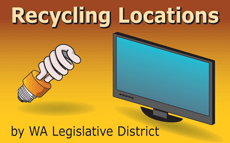Washington Enacts Law Creating New Paint Recycling Program
FOR IMMEDIATE RELEASE
May 9, 2019
Media Contacts:
Scott Cassel, PSI: 617-236-4822, scott@productstewardship.us
Brett Rodgers, ACA: 202-719-3707, brodgers@paint.org
Peter Thermos, NWPSC: 206-850-7383, pthermos@prrbiz.com
Heather Trim, ZWW: 206-351-2898, heather@zerowastewashington.org
Washington Enacts Law Creating New Paint Recycling Program
Nation’s 10th Paint Stewardship Law, First in 4 Years
BOSTON, Mass. —Washington joined eight states and the District of Columbia with a law paving the way for an industry-run collection and recycling program for leftover architectural paint. The law, signed today by Governor Jay Inslee, will provide Washington residents and businesses with a safe, convenient, and environmentally responsible way to reuse or recycle their leftover latex and oil paint, while at the same time reducing the financial burden of waste management that local governments now shoulder.
"This new law will help protect the environment by making it easy for Washington residents and businesses to recycle leftover house paints that pile up in our basements, garages, and storage facilities," said State Rep. Strom Peterson, sponsor of SHB 1652. "The program also will save money for towns and taxpayers by freeing up resources currently dedicated to processing unused paint through local household hazardous waste programs."
The new program will be guided by substitute HB 1652, which was passed by the Washington State Legislature with strong support in both chambers. "We look forward to building on our 10 years of experience in other states to launch a program in Washington that not only works for the paint industry, but also meets public demand for convenience, efficiency, and cost effectiveness," said Heidi McAuliffe, vice president of government affairs for the American Coatings Association (ACA).
"We have heard from residents and businesses across Washington about all of the used paint in their garages and storerooms," said Heather Trim, executive director of Zero Waste Washington. "We anticipate that this new program will be wildly popular once it gets started."
In King County, the most populous county in Washington, the Hazardous Waste Management Program (HWMP) is already seeing a demand at its facilities for convenient and safe collection of many products covered under the bill. In 2018, the program collected 384,362 pounds of oil-based paints and stains. "We applaud the Legislature for taking action on this important issue," said Lynda Ransley, HWMP Director. "This legislation benefits King County residents and all Washingtonians, as paint manufacturers will now be responsible for the recycling and disposal of their products."
The Washington program could result in the collection and environmentally-responsible reuse and recycling of more than 1.3 million gallons of paint annually. The program is anticipated to be run by PaintCare, a nonprofit organization created by the paint industry through ACA, which manages paint collection programs in the other states that have enacted similar legislation – Oregon, California, Colorado, Minnesota, Connecticut, Rhode Island, Maine, and Vermont, as well as the District of Columbia.
SHB 1652 is based on the "product stewardship" model of assigning the responsibility of collection, recycling, and disposal of unwanted products to manufacturers. The bill adds a small recycling fee to the price of paint to finance the stewardship program; ensures a level playing field among all manufacturers; and involves industry management of the program with voluntary public and private sector collection sites. This model was developed through years of collaboration among multiple stakeholders, including ACA and members of the Northwest Product Stewardship Council, in a national effort conceived of and facilitated by the Product Stewardship Institute (PSI).
"Thanks to the leadership of the paint industry and the perseverance of other stakeholders, Washington has taken a big step forward by enacting a significant product stewardship law," says Scott Cassel, PSI's chief executive officer. "Washington will benefit from millions of dollars of savings each year for its local governments, increased environmental benefits, and additional recycling jobs."
Small local retailers, in particular, have supported the program around the country because it provides increased customer traffic and allows them to provide a valuable community service for customers, who will be able to safely and responsibly reuse and recycle unwanted paint and paint containers.
To date, PaintCare has processed more than 30 million gallons of paint, created 200 jobs, and saved governments (and taxpayers) over $150 million. With more than 1,700 voluntary collection sites (77% at retail locations), the program has created unprecedented convenience for consumers to drop off leftover paint, stains, and varnishes.
The industry stewardship organization is required to implement the program by November 30, 2020.
---------
About the American Coatings Association (ACA)
The American Coatings Association is a voluntary, nonprofit trade association representing paint and coatings manufacturers, raw materials suppliers, distributors, and technical professionals. ACA serves as an advocate and ally for members on legislative, regulatory and judicial issues, and provides forums for the advancement and promotion of the industry through educational and professional development services.
About the Northwest Product Stewardship Council (NWPSC)
The NWPSC is a coalition of government organizations in Washington and Oregon that operates as an unincorporated association of members, which works to integrate product stewardship principles into the policy and economic structures of the Pacific Northwest.
About Zero Waste Washington (ZWW)
Zero Waste Washington protects people and our natural world by advocating for products designed and produced to be healthy, safe, and continually recycled and reused. We are the public’s voice for zero waste.
About the Product Stewardship Institute (PSI)
PSI is a national nonprofit that reduces the health and environmental impacts of consumer products with a strong focus on sustainable end-of-life management.
###

